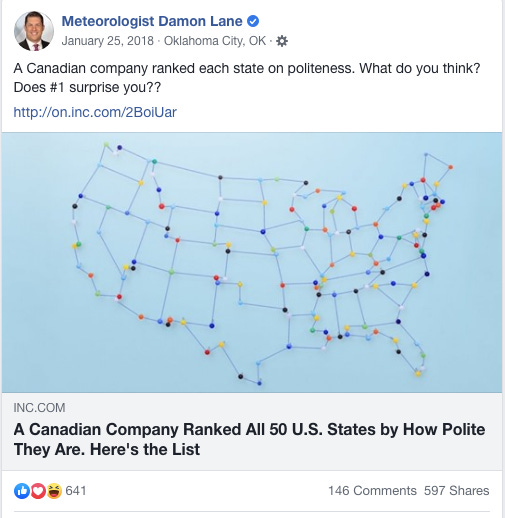Use your social intelligence
Tips on going back to work, with some exposition. Also, 7 other things worth knowing today.
It looks like the tech issues are behind us, knock on wood. Charlie Brown finally kicked the football! Thanks for your kind words about the mini-drama. With that, let’s move on…
A few years ago, I had a nice little hit over on Inc.com. It remains one of my favorite stories there—not so much for what it’s about, but instead for how it came to be.
The headline: “A Canadian Company Ranked All 50 U.S. States by How Polite They Are. Here's the List."
The story went like this. A Toronto-based cloud accounting firm was looking for ways to get featured in media, so they searched for words like “please” and “thank you” in 250,000 invoices that they handled for American clients. Then, they announced that they’d figured out which were the most and least-polite U.S. states. As I wrote at the time:
No, this is not exactly a double-blind study in a peer-reviewed journal; admittedly, it's more of a publicity stunt. But it piqued my interest.
Also, I thought it was funny because the company is from Canada—the land of my mom's birth, in fact—which has a reputation for being the most polite country on the planet.
Anyway, the story went viral. I think this was largely due to the fact that the Canadian company’s little exercise concluded that Oklahoma was rated the most-polite state. Thus, everyone who had a social media platform in Oklahoma shared it: all the local TV stations, the drive time radio DJs, even the governor.
(By the way, free advice: If you want something to go viral, find a way to use it to tell a big group of people something unexpected and positive about themselves.)
Anyway, as I once heard a Canadian say, “Just because we’re polite doesn’t mean we’re nice.” Still, I think Canada must have one of the world’s highest Gross National Politeness Products.
That’s why—wow, this was a long intro, sorry—I noticed when a Canadian newspaper recently offered tips on how to be more polite and adhere to workplace etiquette, if you have to return to the office, post-pandemic.
It comes to us courtesy of the Globe and Mail, and features the owner of a consulting firm called The Etiquette Ladies, run by “Canada’s Etiquette Expert,” Louise Fox.
Among Ms. Fox’s tips:
Mind your own business. "I don’t think we need to be asking others if they’re vaccinated or not vaccinated. Don’t get into those discussions at work. That’s not the time for it."
Hold off on handshakes. “Use your social intelligence and see if that person’s comfort level warrants a handshake. Maybe not. That’s really the essence of good manners, is to make others feel comfortable.”
Don't go in if you're sick. “Now more than ever, people do not want you at the office if you’re not feeling good. But that doesn’t necessarily mean you can’t be productive still and work from home.”
OK, they’re mostly common sense—but common sense is often less than common lately. Personally, I don’t really want to return to an office, but if I had to, a few extra pleases and thank-yous and social intelligence would be much appreciated.
Good article. Probably won’t go viral, but the idea that someone took the time to write it all out feels like progress.
7 other things worth knowing today
A Hawaii member of Congress, Rep. Kai Kahele, reportedly hasn't been to Washington since January, keeps having other members cast his votes for him, and—the kicker—is continuing to work his pre-Congress job as a pilot for Hawaiian Airlines. If true (important words), this would be one of the most insane stories of an employee just ghosting their job that I've ever heard. (Honolulu Civil Beat)
Ukraine on Monday said tens of thousands of people have likely been killed in Russia's assault on Mariupol while the country's rights ombudswoman accused Russian forces in the region of torture and executions. Reuters has confirmed widespread destruction in Mariupol but could not verify the alleged crimes or the estimate of those killed. (Reuters)
And then there were 3: With the closure of a New Jersey store this week, there are now only three remaining Kmart stores in the continental United States, down from more than 2,000 at its peak. (AP)
Meet the Tesla customer who says he returned his car under the 7-day policy two years ago, but has had to keep making payments on it ever since. Nevertheless: “After everything I’ve been put through, I am still a huge believer in Tesla, Elon Musk and electric cars. I hope my story reaches the powers that be at Tesla and they make necessary changes so this does not happen to their future clients.” (CNBC)
Should people only work 32 hours a week? A proposal in the California legislature would require companies with more than 500 employees to start paying overtime, starting with the 33rd hour each week. (Fox 5 NY)
The head of the IRS says 53 percent of IRS employees now work from home full-time, and that agents answer only 20 percent of taxpayers’ phone calls. (2 links, both ATR, here and here)
Did your house make more than you did last year? A new study by Zillow found that home price appreciation in 25 metro areas last year exceeded the median salary in those locations. (WashPost)
Thanks for reading. Photo credit: Unsplash. Want to see all my mistakes? Click here.




I was born and raised in California and am now retired. This is the dumbest thing to be considered during a labor shortage. Overtime after 32 hours? These costs will be passed on to customers and consumers. I can just see employers abandoning California in droves.
Working a 32-hour week, as proposed in CA? Yikes! That would be fantastic! My working life up until Covid was always a 40-hour week (in the Northeast). A 32-hour week seems like vacation. We should make that nationwide, then, maybe, we’d be more civilized and could follow Ms Fox’s advice because we’d be less stressed.